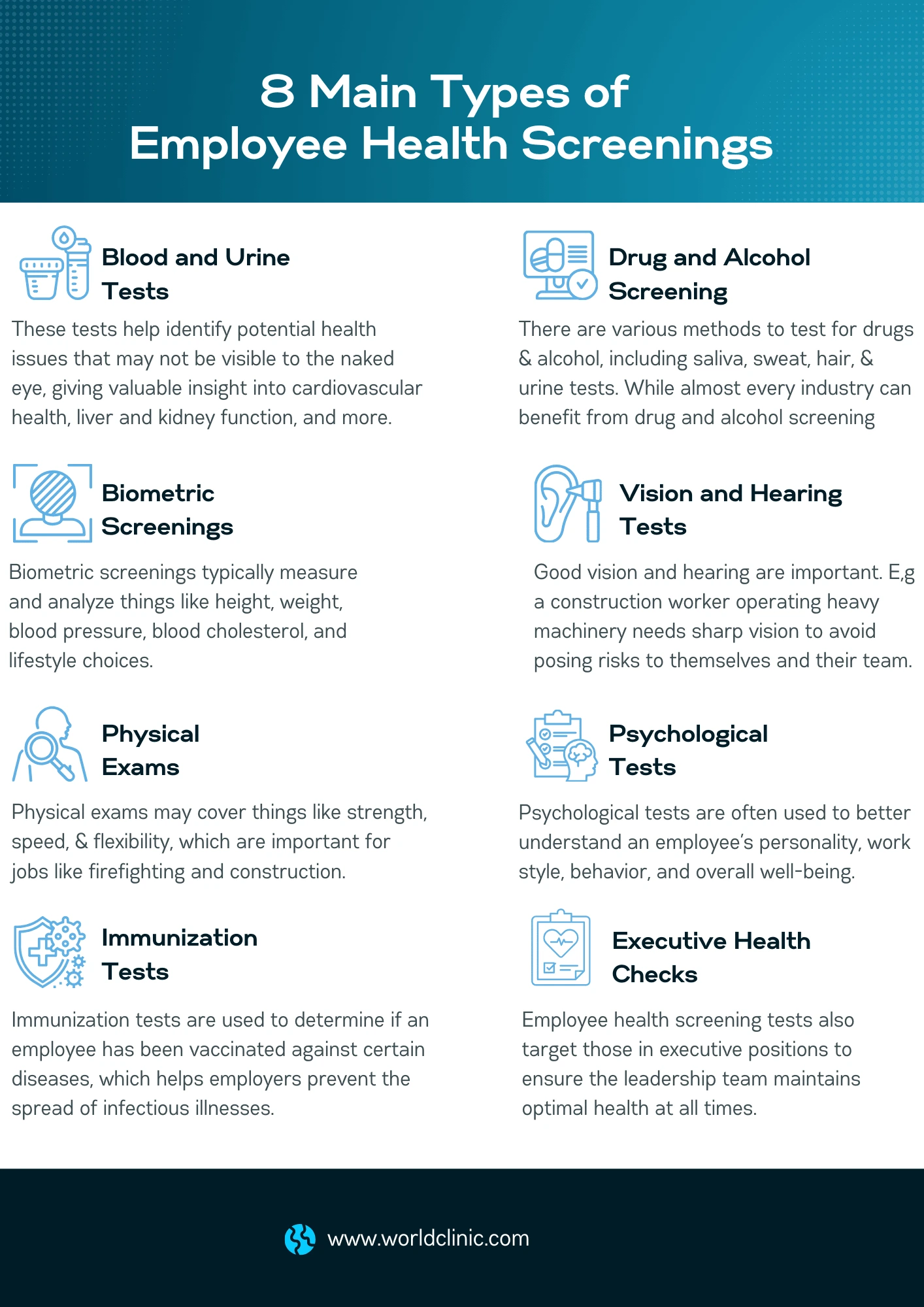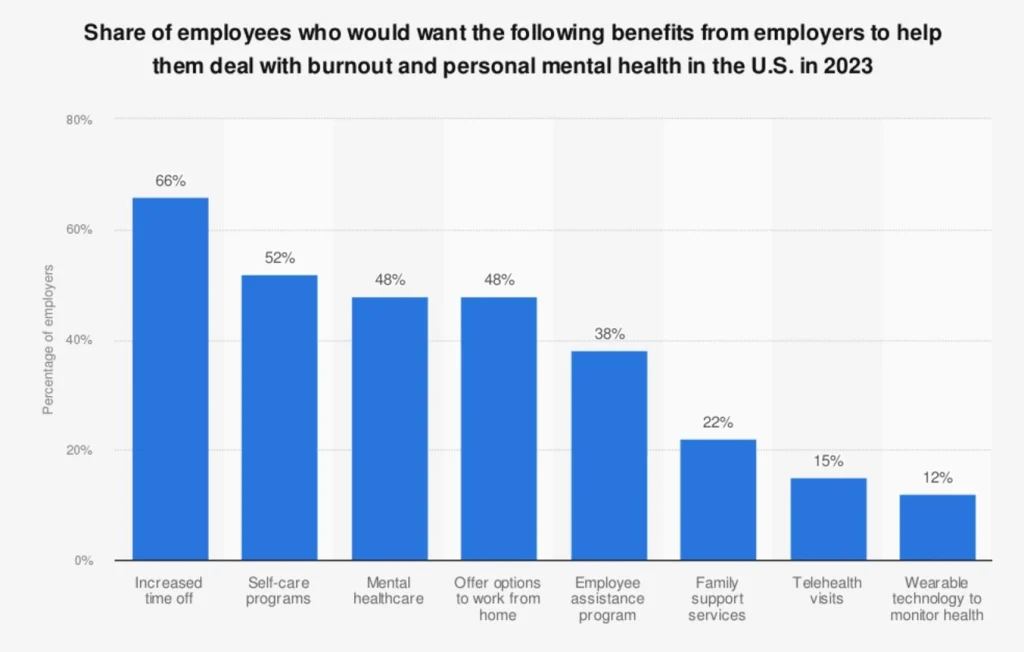Employee health screenings have proven to be a powerful tool in achieving workplace health and wellness. These screenings ensure your workers are well-suited for particular roles while also demonstrating your commitment to their overall health.
That said, employers must know how to navigate employee health assessments, which includes understanding the types of tests available and helping employees reduce anxiety associated with these tests.
Keep reading for a comprehensive guide on employee health checks, where we’ll explore the main types of health screenings, what benefits you can expect, and legal standards and guidelines that you should be aware of.
What is an Employee Health Screening?
An employee health screening is an assessment used by employers to identify potential health risks among their employees. The overall goal of employee health checkups is to ensure workers are physically able to perform tasks, which helps companies reduce injuries, increase productivity, detect health issues early on, and manage the costs associated with healthcare claims.
These assessments may be given during the job application process or after employees have already started working for your company. From routine physical evaluations to psychological tests, these screenings cover a variety of health-related concerns.
Why are Employee Health Screenings Important?
Some companies may wonder: Do we need employee health screenings? Will they make a difference?
In short, yes, employee screenings are an important aspect of workplace health and overall employee health benefits —but to better understand why, let’s explore 3 key reasons:
- They help you assess whether the employee meets all the physical requirements of the job.Depending on the role, you may be looking for a candidate that has perfect vision, great hand-eye coordination, or can lift heavy objects, and health screenings are critical to understanding an employee’s true capabilities. For instance, if an employee has a condition that makes it difficult to lift heavy cargo, then they might not be the best fit for a role where that is a critical requirement, as they could face significant health risks.
- They help you understand if the employee poses any health risks to themselves or others in the workplace. In some situations, health conditions can pose a risk to the entire team. For example, if your team operates heavy machinery and an employee has a condition that causes sudden dizziness or fainting, this could lead to serious accidents, posing a high risk to both the individual and their coworkers.
- They help you understand what accommodations would be needed if hiring employees with disabilities. Health screenings provide valuable insights into the specific needs and potential limitations of each employee. With this information, employers can make necessary adjustments to work environments to promote safe working conditions.
8 Main Types of Employee Health Screenings

What are the different types of staff health screenings? What should I test for?
The type of screening you require depends on the unique needs of your company and specific job roles. That said, here are 8 common tests that are worth considering:
1. Blood and Urine Tests
Blood tests can be used to check things like cholesterol, glucose levels, and other important vitals, while urine tests can check pH levels, white blood cells, proteins, and more. These tests help identify potential health issues that may not be visible to the naked eye, giving valuable insight into cardiovascular health, liver and kidney function, and more.
2. Drug and Alcohol Screening
There are various methods to test for drugs and alcohol, including saliva, sweat, hair, and urine tests. While almost every industry can benefit from drug and alcohol screening, it’s especially important in sectors like transportation, healthcare, manufacturing, and public safety.
3. Biometric Screenings
Biometric screenings typically measure and analyze things like height, weight, blood pressure, blood cholesterol, and lifestyle choices. Since these screenings are used to evaluate an employee’s health risks, additional tests may be required depending on the position requirements.
4. Vision and Hearing Tests
Having great vision and hearing is a critical requirement for many jobs. For instance, a construction worker who operates heavy machinery should have great vision; otherwise, they could pose serious risks for both themselves and their team. By conducting vision and hearing tests, employers can determine which employees are right for the job or identify whether hearing aids or corrective lenses might be required.
5. Physical Exams
Physical exams may cover things like physical strength, endurance, speed, and flexibility, which are important for jobs like firefighting and construction. They may also include a biometric screening to evaluate factors like blood pressure and weight, as these are important elements in many professions.
6. Psychological Tests
Psychological tests are often used to better understand an employee’s personality, work style, behavior, and overall well-being. These assessments may be used during the recruitment process, after an injury, or to determine if an employee is mentally fit for a job.
7. Immunization Tests
Immunization tests are used to determine if an employee has been vaccinated against certain diseases, which helps employers prevent the spread of infectious illnesses. This is especially important for employees who work in healthcare, eldercare facilities, daycare, or with individuals who are at greater risk of infection.
8. Executive Health Checks
Employee health screening tests also target those in executive positions to ensure the leadership team maintains optimal health at all times. Executive physicals cover a range of tests, such as cholesterol tests, a complete blood count, screening for colon cancer, stress testing, and much more.
Employee Health Screening Benefits

Health screenings offer an array of benefits to both employers and employees. Keep reading to learn how better health is beneficial for everyone in your company.
For the Employer
As an employer, employee health screenings offer your company many short- and long-term benefits, including:
- Fewer Injuries and Accidents: Health screenings help employers promote a culture of safety and health in the workplace, which not only prevents costly injuries but also improves employee morale.
- Reduced Insurance Costs: By keeping employees healthy, addressing health concerns early on, and managing chronic conditions more effectively, you may help secure lower insurance premiums while also reducing costs associated with workers’ compensation.
- Health and Safety Compliance: Employee screening mitigates potential risks, which helps employers comply with health and safety standards and avoid fines associated with non-compliance.
- Higher Employee Productivity: By prioritizing health in your company, you can help prevent absenteeism and extended periods of sick leave, therefore increasing overall productivity as a result.
For the Employee
Employee health screening tests are beneficial for both new hires and long-time staff alike. The benefits include:
- Supports Employee Safety and Health: Whether you offer annual employee health screenings or require something more specific—like vision and hearing tests—these screenings help employees improve their health and prevent future medical complications.
- Peace of Mind: By creating a safe and healthy work environment, employees can carry out their everyday tasks with peace of mind, which creates a happier overall atmosphere.
- Early Detection of Health Issues: Health screenings may identify health issues that employees were not aware of, which enables them to address potential concerns before they escalate.
- Access to Wellness Resources: Employees and executives can take advantage of comprehensive health programs, which helps them live a healthier lifestyle even outside the workplace.
Legal Standards and Guidelines for Employment Health Screenings
To ensure compliance with duty of care obligations throughout employee health checkups, here’s an overview of key laws and regulations, employee privacy and confidentiality, and tips to consider when implementing new screening procedures.
Key Laws and Regulations
Three key regulations that your company should be aware of include:
- ADA: The Americans with Disabilities Act (ADA) prohibits discrimination against individuals with disabilities in various areas of public life, including employment. This means that as an employer, you’re responsible for providing a fair hiring process for everyone. However, this does not mean you cannot request pre-employment assessments if they are designed to test the employee’s ability to fulfill the job responsibilities.
- OSHA: The Occupational Safety and Health Administration, or OSHA, sets and enforces standards to assure America’s workers have safe and healthful working conditions. This may include health screenings for high-risk jobs, such as exposure to hazardous materials or other occupational dangers. Click here to check OSHA’s Medical Screening and Surveillance Requirements.
- GDPR: The General Data Protection Regulation (GDPR) is a data security and privacy law for EU citizens. If you operate in or have employees in the European Union, you must follow these laws for collecting, processing, and storing health data.
Employee Privacy and Confidentiality
There are multiple ethical considerations that companies must be aware of, such as:
- Confidentiality: Information gathered during these screenings must be kept confidential and stay compliant with privacy laws and regulations.
- Data security: This includes protecting sensitive health information from unauthorized access.
- Employee rights: Health screenings should protect confidentiality, avoid unfairly targeting specific groups, and comply with local laws.
- Equal treatment of employees: This is also critical, as it’s illegal to discriminate against employees or applicants based on genetic information.
As we’ll see below, there are a number of tips businesses can use to ensure compliance and create a fair process that inspires trust.
Tips for Employers to Stay Compliant
Companies must stay compliant with regulations to avoid fees, guarantee employee privacy, and ensure their employees feel comfortable with the entire process.
As you conduct employee health screenings, keep these tips in mind:
- Ensure screenings are job-related and consistent with business necessity.
- Protect employee health information by maintaining confidentiality and limiting access.
- Follow OSHA guidelines for workplace safety-related health screenings.
- Obtain explicit consent for collecting and processing sensitive health data.
- Do not disclose individual health information to coworkers or unauthorized parties.
- Avoid discriminatory practices, such as singling out employees for additional tests based on age, gender, race, or medical conditions.
Common Challenges with Employee Health Screenings
Companies may face multiple challenges when implementing health screenings. These include:
- Care coordination complexities: Companies often face challenges in coordinating care among different departments, as this requires collaboration between HR, finance, and operations to address diverse workplace needs.
- Referral management and intricacies: In the event of an emergency, your employees may require quick access to specialized care and medical services, meaning your company must know how to effectively handle and manage patient referrals. This is especially important when considering the benefits of executive health, as leadership team members may need immediate access to top-tier medical services to ensure they remain healthy.
- Cost and utilization management: Employers must choose the right healthcare provider, provide tailored screenings, and ensure their program is successful all while balancing costs—a big obstacle for many companies.
- Patient privacy and compliance with regulations: As mentioned, patient privacy and compliance are critical factors in health screenings. If companies do not follow regulations, they may face legal consequences.
While employee health screenings offer a number of benefits, they must be handled with care to ensure they provide companies with value. For that reason, having a partner that provides reliable medical care is key to implementing a successful wellness program.
At WorldClinic, we provide concierge medical services that provide around-the-clock support. If any of your employees have health concerns or need medical advice, we’ll help them resolve their concerns quickly and refer them to specialists if required. This ensures they have access to quality care, no matter where they’re located in the world.
Explore the available employee health solutions to learn more.
Conclusion
Employee health screening programs are a great asset to a healthy work environment. In addition to minimizing injuries and reducing insurance costs, employers can use these screenings to foster a culture that encourages health and safety.
With WorldClinic’s concierge medical services, your business can access high-quality employee care while ensuring compliance with local laws and regulations. Whether you require 24/7 support, rapid diagnosis and treatment, or ongoing support, our team will provide your employees with comprehensive care from anywhere in the world.
Contact us today to learn more about our executive healthcare services.
Employee Health Screenings FAQs
Are employee health screenings mandatory for all jobs?
No, employee health screenings are not mandatory for all jobs. That said, they are required in some industries or under certain working conditions.
Are health screening results kept confidential?
Yes, companies are legally required to keep sensitive health information confidential.
Who needs an employee health screening?
Staff health screenings are typically used to determine whether job candidates or employees can successfully perform their job responsibilities. In addition to new employee health screenings, they can also be used as annual checkups to monitor health and identify potential risks.
Can an employee health screening be customized to specific health needs?
Yes, there are several health risk assessments—including biometric screenings, drug and alcohol tests, vision and hearing tests, and more—that can be selected and designed to determine if an employee meets the specific needs of a job role.
How can companies implement employee health screenings effectively?
Companies must define their unique goals, determine the risk factors of each job, and make screenings accessible to their employees. They can also partner with concierge medical services to ensure reliable care, 24/7 support, and compliance with laws and regulations.


